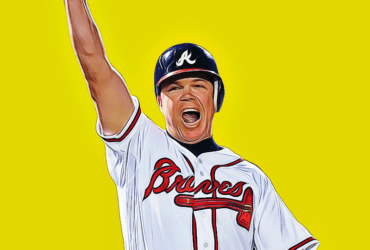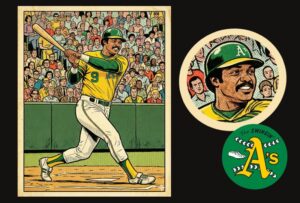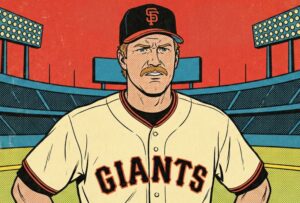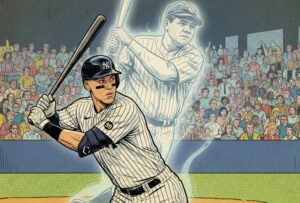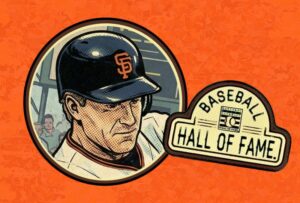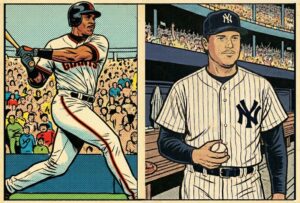On the final day of the 2011 season the Atlanta Braves experienced heartbreak. Their loss, coupled with a victory by the St. Louis Cardinals, cost the Braves the wild card spot that they had held for much of the season.
But the 2011 season wasn’t a complete loss for the Braves. In fact, in terms of winning it was historic.
You see, the Braves finally reached the .500 mark in 2011. After a long, and I mean loooong journey, the Braves made it to the break-even mark again after 88 years.
The Braves trace their roots back to the Boston franchise in the National League in the 19th century, in fact they were a member of what is considered by most baseball experts to be the very first “major” league. In 1876, the Boston Red Stockings – as they were known then – debuted in the fledgling league. In those pioneering days of pro “base ball”, Boston was pretty darned good. They finished first or second in five of the first nine seasons of the NL, and then in the 1890s they really cranked it up.
By that time they were known as the Beaneaters (imagine the possible promotional giveaways) and Boston rivaled the Baltimore Orioles for the title of best team in baseball. In 1892, 1893, 1897, and 1898, they posted the best record in the league. With star pitcher Kid Nichols, outfielder “Sliding Billy” Hamilton and other future Hall of Famers, the Beaneaters helped spread the popularity of baseball in Massachusetts and the rest of the east coast.
Then came some lean years in the early 20th century, but in 1914 the “Miracle Braves” went from last to first and won the World Series, their first modern championship. But losing seasons mounted after that, and in 1923, in the midst of their second straight 100-loss campaign, the Braves fell below the .500 mark all-time. At season’s end they had 3,121 wins and 3,159 losses. From then on, until 2011, the Braves were under the .500 mark. The low point was in 1945, when the team all-time mark was at .473. The team was so terrible back then that they asked their fans to help them pick a new name. As a result, for a few years they were known as the Bees.
And so it went for decades, through moves to Milwaukee and later Atlanta, the franchise tried to dig itself out of the hole and get to the even-steven mark. For 14 straight seasons, from 1953 to 1966, the team posted a winning record, on the strength of a roster filled with names like Aaron and Spahn and Matthews. Still, the Braves were more than 200 games under .500, and after stinking for pretty much the entire 1970s and being mediocre again in the 80s, the franchise was more than 500 games under .500 after the 1990 season.
Yes, every one of their games was beamed into our living rooms via cable television, but you couldn’t make us watch them.
But since 1991, the Braves have been winning a lot. A child born in that year would think the Braves were constitutionally mandated to finish in first place. Beginning in ’91, the Braves won 13 of 14 division titles, winning 100 games six times. Sure they were sort of the Buffalo Bills of MLB, losing nearly every year in the post-season, but they kept climbing the hill of respectability, inching closer to the .500 plateau all-time. With each victory off the arms of Greg Maddux, Tom Glavine, and John Smoltz, with every game-winning hit off the bat of Chipper Jones, the Braves were chasing decades-old ghosts.
In 2003, the Braves moved to 71 games under the .500 mark. The following year they chopped 30 games off that figure. After winning 91 games and making the playoffs as a wild card in 2010, they were only nine games under the .500 mark, also fast approaching their 10,000th franchise win. Would they get to 10,000 wins before 10,000 losses? Would the Braves reach the .500 mark after nearly nine decades?
Would anyone notice?
They needed to get to nine games over .500 in 2011 – and hopefully stay there – to reach the even mark for franchise history. They played “win a few, lose a few” in April before reeling off six straight wins when the calendar turned to May. Now, surely the spirits of Kid Nichols and Billy Hamilton, and Tommy Holmes and Warren Spahn, were working their celestial magic in their favor.
Again, when the calendar turned – this time to June – the Braves got hot. On June 10, Tim Hudson defeated the Astros to improve the club’s 2011 record to 36-28. They were one game away from a milestone of generational importance but of absolutely no significance in the present. That didn’t stop the baseball gods from entering with a sprinkling of magic fairy dust.
The next night, the Braves matched up against the Astros again at Minute Maid Park in Houston. The Astros jumped out to a 2-0 lead before Jones drove in a run and then Eric Hinske, who was born just a few miles from Milwaukee, where the Braves had once been the toast of the town, hit a home run that would have made Hank Aaron proud, tying the game at 2-2. That’s the way it stayed heading into extra-innings, the Braves teetering with a record of 9,981-9,982. One of the scales of the baseball universe was swaying in the balance.
Jordan Schafer, who hadn’t even been born when Dale Murphy was winning MVP awards for the Braves in the 1980s, led off the top of the 10th with a single and then swiped second base in true Ralph “Roadrunner” Garr fashion. Dan Uggla followed with a walk, which brought Brian McCann to the plate. A Georgia native, McCann had grown up rooting for the Braves – cheering from the stands at Fulton-County Stadium for Chipper and Maddux and Glavine and “The Crime Dog” and Dave Justice – the gang who had helped start the franchise on the uphill road to the .500 mark.
McCann smoked a 2-1 pitch deep into the right field stands for a three-run homer. Another run came across – scored appropriately by Chipper – and the Braves had a 6-3 lead. Reliever Craig Kimbel came into close out the win for Atlanta. On the day Kimbel had been born in 1988, the Braves all-time record saw them 419 games under .500. Now they were three outs from being right where they started back in 1876. Kimbel had more good karma working for him and the team – he was born in Huntsville, Alabama – the birthplace of Henry Aaron. Yes, the baseball gods had lined it up – the man on the mound was a direct baseball descendant of the Aaron Crimson Tide bloodlines. But outside maybe someone in the Braves’ PR office, no one knew this was significant.
Kimbel struggled a little – he pitched like he was Hank Aaron – but he finally nailed down the win and Atlanta was nine games over .500 for the season, just two games behind the Phillies for first place. But more importantly in a cosmic way was the fact they were now 9,982 up and 9,982 down. For the first time since the Harding administration the Braves were at .500 all-time.
There weren’t any celebrations, no commemorative cups, but the deed was done. And since they’d worked so damned hard for 88 years to get back to .500, they made sure to stay winners. The next day they beat the ‘Stros again, and a 14-2 stretch that started on June 19 pushed them above the mark for good. On July 15, their first game back from the All-Star break, the Braves won their 10,000th game, punishing the Washington Nationals, 11-1. Their ace, Tim Hudson, channeling Spahn, won that day.
Even though the Braves suffered that sour loss in game #162, they were still winners. As far as the baseball universe is concerned, they’re on the correct side of the ledger.

